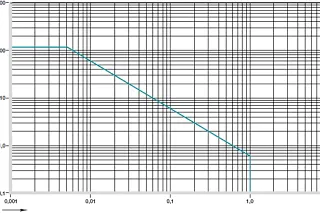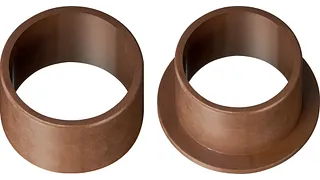Change Language :
iglidur® H2 - material data
The most important specifications at a glance
In applications with iglidur H2 plain bearings, economical aspects are in focus. It is the first time that it is possible to offer such a high-performance bearing for high volume applications with these technical advantages at such a low price: temperatures up to +200°C, permitted surface pressure up to 110N/mm², and excellent chemical resistance. The iglidur H2 plain bearings are self-lubricating and suitable for all motions.
| Descriptive technical specifications | ||
|---|---|---|
| Wear resistance at +23°C | - 🟧 ⬜️ ⬜️ ⬜️ ⬜️ + | More information on wear resistance |
| Wear resistance at +90°C | - 🟧 🟧 ⬜️ ⬜️ ⬜️ + | |
| Wear resistance at +150°C | - 🟧 🟧 ⬜️ ⬜️ ⬜️ + | |
| Slide property | - 🟧 ⬜️ ⬜️ ⬜️ ⬜️ + | Coefficient of friction, dynamic, against steel: µ 0.07 – 0.30 |
| Wear resistance under water | - 🟧 🟧 ⬜️ ⬜️ ⬜️ + | |
| Media resistance | - 🟧 🟧 🟧 🟧 🟧 + | More information on media resistance |
| Resistant to edge pressures | - 🟧 ⬜️ ⬜️ ⬜️ ⬜️ + | |
| Resistant to shock and impact loads | - 🟧 ⬜️ ⬜️ ⬜️ ⬜️ + | |
| Dirt resistance | - 🟧 🟧 ⬜️ ⬜️ ⬜️ + |
Temperatures
iglidur H2 is an extremely temperature-resistant material. The maximum permissible short-term temperature is +240°C and therefore allows the use of iglidur H2 plain bearings in applications in which the bearing is subjected to, e.g. a paint drying process without further load. With increasing temperatures, however, the compressive strength of iglidur H2 plain bearing decreases more than that of iglidur H. The temperatures prevailing in the bearing system also have an influence on bearing wear. Wear increases with rising temperatures. Additional protection is required at temperatures higher than +110°C.
Temperatures, thermal expansion coefficient
| min. application temperature | Upper application temperature, long-term | Upper application temperature, short-term | In addition secure axially from |
|---|---|---|---|
| -40°C | +200°C | +240°C | +110°C |
Permissible surface speeds
The development of iglidur H2 focussed on cost aspects and mechanical strength. The permissible surface speeds of this bearing are rather low, which primarily allows it to be used for slow movements or in intermittent operation.
Surface speeds of various iglidur materials
| Maximum surface speeds [m/s] | Rotating | Oscillating | linear |
|---|---|---|---|
| Long-term | 0.9 | 0.6 | 2.5 |
| Short-term | 1.0 | 0.7 | 3.0 |
Permissible pv values

Diagram 01: Permitted pv values for iglidur H2 plain bearings with 1mm wall thickness in dry operation against a steel shaft, at +20°C, installed in a steel housing
X = surface speed [m/s]
Y = pressure [MPa]
pv value, max. (dry)
MPa · m/s
0.58
<a 0="[" 1="o" 2="b" 3="j" 4="e" 5="c" 6="t" 7=" " 8="O" 9="b" 10="j" 11="e" 12="c" 13="t" 14="]" href="/de-de/website/gleitlager/wiki/p-x-v-wert-und-schmierung" uuid="f16b1d8b-0ff1-4a28-951c-3fbeec74eafd" target="_self">Information on pv value and lubrication
Mechanical specifications
The maximum recommended surface pressure is a mechanical material parameter. Conclusions about the tribology cannot be drawn from this. The compressive strength of iglidur H2 plain bearing decreases with increasing temperatures. Diagram 02 illustrates this relationship. Diagram 03 shows the elastic deformation of iglidur H2 under radial load. Under the maximum recommended surface pressure of 110MPa, the deformation at room temperature is less than 3%. The values for flexural and compressive strength at room temperature are higher than those of iglidur H.
Friction and wear
Diagrams 04 to 06 illustrate how the coefficients of friction of iglidur H2 plain bearing changes at different surface speeds, loads and roughnesses.
Coefficients of friction against steel (Ra = 1 μm, 50 HRC):
| iglidur H2 | dry | Greases | Oil | Water |
|---|---|---|---|---|
| Coefficient of friction μ | 0.07-0.30 | 0.09 | 0.04 | 0.04 |
Shaft materials
When it comes to the wear resistance of combinations with iglidur H2, it must be pointed out once again that these bearings were developed for high mechanical strength. However, the wear resistance of no bearing/shaft combination reaches the values of iglidur H370 with the corresponding shaft. If iglidur H2 bearings are used, they should not be combined with hard chrome-plated shafts. Shafts made of Cf53 and 304 stainless steel are much more suitable, as can be seen in diagrams 06 and 07.
Chemical resistance
iglidur H2 plain bearings have good resistance to chemicals. They are resistant to most lubricants. Most weak organic and inorganic acids do not attack iglidur H2.
All data at room temperature [+20 °C], + resistant 0 conditionally resistant - non-resistant
| Chemicals | Resistance |
|---|---|
| Alcohols | + |
| Greases, oils without additives | + |
| Hydrocarbons | + |
| Fuels | + |
| Strong alkalines | + |
| Strong acids | 0 to - |
| Diluted alkalines | + |
| Diluted acids | + up to 0 |
Moisture absorption
Installation tolerances
iglidur H2 plain bearings are standard bearings for shafts with h-tolerance (recommended minimum h9). The bearings are designed for press-fit into a housing machined to a H7 tolerance. After being assembled into a nominal size housing, the inner diameter automatically adjusts to the F10 tolerances.
Important tolerances according to ISO 3547-1 after press-fit:
| Diameter d1 [mm] | Housing H7 [mm] | iglidur H2 plain bearing F10 [mm] | Shaft h9 [mm] |
|---|---|---|---|
| up to 3 | +0.000 +0.010 | +0.006 +0.046 | -0.025 +0.000 |
| > 3 up to 6 | +0.000 +0.012 | +0.010 +0.058 | -0.030 +0.000 |
| > 6 up to 10 | +0.000 +0.015 | +0.013 +0.071 | -0.036 +0.000 |
| > 10 up to 18 | +0.000 +0.018 | +0.016 +0.086 | -0.043 +0.000 |
| > 18 up to 30 | +0.000 +0.021 | +0.020 +0.104 | -0.052 +0.000 |
| > 30 up to 50 | +0.000 +0.025 | +0.025 +0.125 | -0.062 +0.000 |
| >50 to 80 | +0.000 +0.030 | +0.030 +0.150 | -0.074 +0.000 |
| >80 to 120 | +0.000 +0.035 | +0.036 +0.176 | -0.087 +0.000 |
| > 120 up to 180 | +0.000 +0.040 | +0.043 +0.203 | +0.000 +0.100 |

Buy iglidur H2 products in the online shop
- Large selection of moulds and materials
- Available within 24 hours
- No minimum order value
- No minimum order quantity
Typical application areas
Consulting
I look forward to answering your questions
Hennlich OOD | Хенлих ООД+359 32 621929Write e-mail
Shipping and consultation
In person:
Monday to Friday from 7 am - 8 pm.
Saturdays from 8 am- 12 pm.
Online:
24h
WhatsApp-Service:
Montag – Freitag: 8 – 16 Uhr










